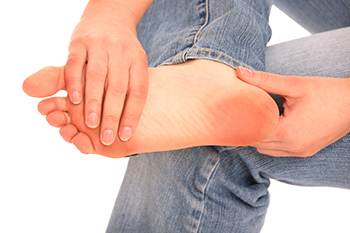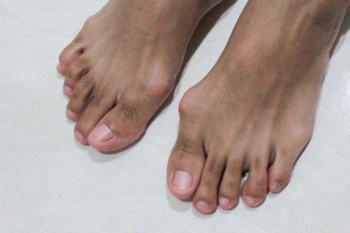Items filtered by date: December 2023
Common Foot Problems

Our feet bear the weight of our bodies and help us to move about. However, they are also susceptible to a range of common problems that can be quite uncomfortable. One prevalent issue is bunions, which occur when the big toe joint becomes misaligned and causes a painful bump. Another common ailment is plantar fasciitis, characterized by sharp heel pain due to inflammation of the tissue that supports the arch of the foot. Ingrown toenails can be particularly bothersome, causing pain and potential infection. Athlete's foot is a fungal infection that leads to itching and peeling skin on the feet. Corns and calluses are also frequent, resulting from friction and pressure on the skin. To keep your feet in top shape, it is essential to be mindful of these common problems. If you have any type of foot pain, it is suggested that you are under the care of a podiatrist who can offer the correct treatment for your problem.
Foot Pain
Foot pain can be extremely painful and debilitating. If you have a foot pain, consult with Gary J. Kaiserman, DPM from Achilles Footcare Center. Our doctor will assess your condition and provide you with quality foot and ankle treatment.
Causes
Foot pain is a very broad condition that could be caused by one or more ailments. The most common include:
- Bunions
- Hammertoes
- Plantar Fasciitis
- Bone Spurs
- Corns
- Tarsal Tunnel Syndrome
- Ingrown Toenails
- Arthritis (such as Gout, Rheumatoid, and Osteoarthritis)
- Flat Feet
- Injury (from stress fractures, broken toe, foot, ankle, Achilles tendon ruptures, and sprains)
- And more
Diagnosis
To figure out the cause of foot pain, podiatrists utilize several different methods. This can range from simple visual inspections and sensation tests to X-rays and MRI scans. Prior medical history, family medical history, and any recent physical traumatic events will all be taken into consideration for a proper diagnosis.
Treatment
Treatment depends upon the cause of the foot pain. Whether it is resting, staying off the foot, or having surgery; podiatrists have a number of treatment options available for foot pain.
If you have any questions, please feel free to contact our offices located in Forest Lane and West Kiest Boulevard Dallas, TX . We offer the newest diagnostic and treatment technologies for all your foot care needs.
Causes and Treatment of Bunions

Bunions, characterized by bony protrusions at the base of the big toe, result from various factors like genetics, wearing tight shoes, and poor foot mechanics. They can cause discomfort and pain. Treatment for bunions typically involves wearing roomy, supportive footwear, or using orthotic inserts to improve foot alignment. Additionally, it may be beneficial to apply padding and taping for pain relief and engage in helpful exercises. For severe bunions, surgical intervention may be necessary to correct the deformity. If you are suffering from a painful bunion, it is suggested that you schedule an appointment with a podiatrist for suitable treatment based on the severity of your condition.
If you are suffering from bunions, contact Gary J. Kaiserman, DPM of Achilles Footcare Center. Our doctor can provide the care you need to keep you pain-free and on your feet.
What Is a Bunion?
A bunion is formed of swollen tissue or an enlargement of boney growth, usually located at the base joint of the toe that connects to the foot. The swelling occurs due to the bones in the big toe shifting inward, which impacts the other toes of the foot. This causes the area around the base of the big toe to become inflamed and painful.
Why Do Bunions Form?
Genetics – Susceptibility to bunions are often hereditary
Stress on the feet – Poorly fitted and uncomfortable footwear that places stress on feet, such as heels, can worsen existing bunions
How Are Bunions Diagnosed?
Doctors often perform two tests – blood tests and x-rays – when trying to diagnose bunions, especially in the early stages of development. Blood tests help determine if the foot pain is being caused by something else, such as arthritis, while x-rays provide a clear picture of your bone structure to your doctor.
How Are Bunions Treated?
- Refrain from wearing heels or similar shoes that cause discomfort
- Select wider shoes that can provide more comfort and reduce pain
- Anti-inflammatory and pain management drugs
- Orthotics or foot inserts
- Surgery
If you have any questions, please feel free to contact our offices located in Forest Lane and West Kiest Boulevard Dallas, TX . We offer the newest diagnostic and treatment technologies for all your foot care needs.
Wounds That Don't Heal Need to Be Checked
Risk Factors of Tarsal Tunnel Syndrome

Tarsal tunnel syndrome is a condition characterized by the compression of the tibial nerve as it passes through the tarsal tunnel in the ankle. Several factors can increase the risk of developing this syndrome. Some individuals may have foot structures that predispose them to tarsal tunnel syndrome. This includes flat feet or high arches, which can create abnormal pressure on the tibial nerve within the tarsal tunnel. Previous ankle injuries, fractures, or sprains can damage the structures within the tarsal tunnel, potentially leading to compression of the tibial nerve. Underlying medical conditions, such as diabetes, arthritis, or peripheral neuropathy, can increase the risk of nerve compression within the tarsal tunnel. Engaging in activities that involve repetitive foot movements or prolonged standing can strain the tibial nerve, raising the risk of tarsal tunnel syndrome. Wearing improperly fitting shoes or those lacking proper support can contribute to nerve compression in the tarsal tunnel. Excess body weight can exert added pressure on the foot and ankle, potentially compressing the tibial nerve. If you suffer from pain, numbness, or tingling in your ankle, it is suggested that you schedule an appointment with a podiatrist for a proper diagnosis and treatment.
Tarsal tunnel syndrome can be very uncomfortable to live with. If you are experiencing tarsal tunnel syndrome, contact Gary J. Kaiserman, DPM of Achilles Footcare Center. Our doctor can provide the care you need to keep you pain-free and on your feet.
Tarsal Tunnel Syndrome
Tarsal tunnel syndrome, which can also be called tibial nerve dysfunction, is an uncommon condition of misfiring peripheral nerves in the foot. The tibial nerve is the peripheral nerve in the leg responsible for sensation and movement of the foot and calf muscles. In tarsal tunnel syndrome, the tibial nerve is damaged, causing problems with movement and feeling in the foot of the affected leg.
Common Cause of Tarsal Tunnel Syndrome
- Involves pressure or an injury, direct pressure on the tibial nerve for an extended period of time, sometimes caused by other body structures close by or near the knee.
- Diseases that damage nerves, including diabetes, may cause tarsal tunnel syndrome.
- At times, tarsal tunnel syndrome can appear without an obvious cause in some cases.
The Effects of Tarsal Tunnel Syndrome
- Different sensations, an afflicted person may experience pain, tingling, burning or other unusual sensations in the foot of the affected leg.
- The foot muscles, toes and ankle become weaker, and curling your toes or flexing your foot can become difficult.
- If condition worsens, infections and ulcers may develop on the foot that is experiencing the syndrome.
A physical exam of the leg can help identify the presence of tarsal tunnel syndrome. Medical tests, such as a nerve biopsy, are also used to diagnose the condition. Patients may receive physical therapy and prescriptive medication. In extreme cases, some may require surgery.
If you have any questions please feel free to contact our offices located in Forest Lane and West Kiest Boulevard Dallas, TX . We offer the newest diagnostic and treatment technologies for all your foot and ankle needs.
Reasons to Have Foot Surgery

Foot surgery is a decision often made with the goal of alleviating persistent discomfort and enhancing overall foot health. One common reason to have foot surgery is the correction of structural abnormalities, such as bunions or hammertoes, which can cause pain and affect mobility. Surgical intervention may also be necessary to address severe cases of conditions like plantar fasciitis, where conservative treatments have proven insufficient. Removal of painful growths or deformities, such as cysts or bone spurs, is another motive for foot surgery. Injuries, such as fractures or torn ligaments, may require surgical repair to restore normal function. In some cases, joint fusion or replacement becomes a viable option for advanced arthritis. Surgical procedures tailored to specific needs can significantly improve quality of life, reduce pain, and restore mobility, allowing individuals to step into a future with greater comfort and functionality. If you have a specific foot condition and are considering surgery, it is strongly suggested that you are under the care of a podiatrist who can help you determine if this is a correct decision for you.
Foot surgery is sometimes necessary to treat a foot ailment. To learn more, contact Gary J. Kaiserman, DPM of Achilles Footcare Center. Our doctor will assist you with all of your foot and ankle needs.
When Is Surgery Necessary?
Foot and ankle surgery is generally reserved for cases in which less invasive, conservative procedures have failed to alleviate the problem. Some of the cases in which surgery may be necessary include:
- Removing foot deformities like bunions and bone spurs
- Severe arthritis that has caused bone issues
- Cosmetic reconstruction
What Types of Surgery Are There?
The type of surgery you receive will depend on the nature of the problem you have. Some of the possible surgeries include:
- Bunionectomy for painful bunions
- Surgical fusion for realignment of bones
- Neuropathy decompression surgery to treat nerve damage
Benefits of Surgery
Although surgery is usually a last resort, it can provide more complete pain relief compared to non-surgical methods and may allow you to finally resume full activity.
Surgical techniques have also become increasingly sophisticated. Techniques like endoscopic surgery allow for smaller incisions and faster recovery times.
If you have any questions please feel free to contact our offices located in Forest Lane and West Kiest Boulevard Dallas, TX . We offer the newest diagnostic and treatment technologies for all your foot and ankle needs.

